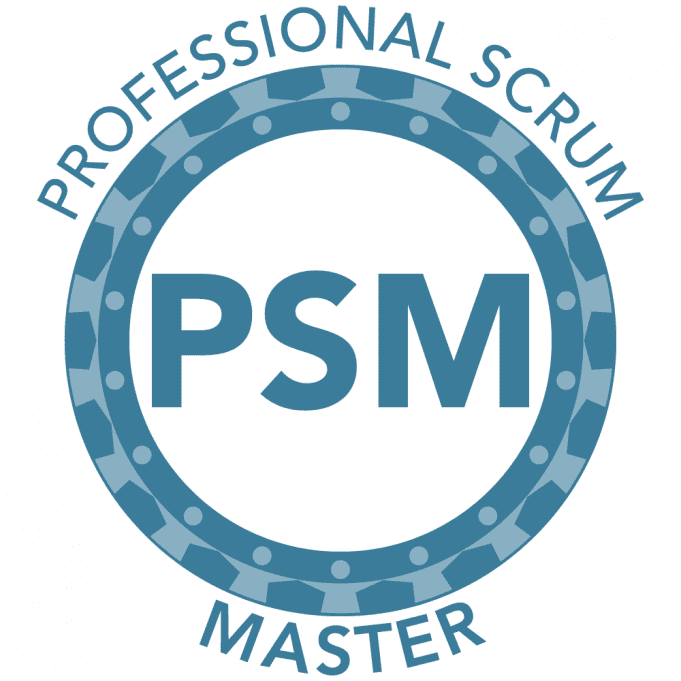The Professional Scrum Master or PSM is a 2-day long course covering the principles and process theory of the Scrum framework. It includes the rules, roles, and mechanics of the framework that are used by professionals to increase efficiency in the organization. For this, they use the advanced tools, work with teams, address the organization, coach, and facilitate the techniques. All the attendees of the course have to learn through modules and exercises. During the course, you will be challenged to look at the situations using the Scrum principles and have a better understanding of what to do. It is one of the best courses for people who want to become Scrum masters or just want to support and improve the effectiveness and efficiency of the software development team.
From matchmaking website BharatMatrimony.com to startup unicorn Freshworks, Chennai is home to several prominent startups. So, the demand for PSM professionals is also quite high in this city. There are two associated certifications with the Professional Scrum Master course – PSM I and PSM II. Once you complete the PSM course on sites like www.knowledgehut.com, you will receive a password through which you have to take the PSM I assessment. You will also be entitled to a discount on the PSM II assessment. You must obtain the minimum passing score in the exam to get these industry-recognized certifications. Scrum.org has a public list of all the PSM I and II certification holders.
If you want to make the most of your PSM course, you should try the following:

Study the Scrum Guide
Pass the Scrum Open assessment
Have an understanding of how Scrum works. For this, you can either participate in a course like the Professional Scrum Foundations or work on a Scrum team
Get closely involved in the process of building or improving a software application or product.
Read one of the Scrum books.
Make sure that you have the right PSM trainer. Here is how you can find the best one for you:

Ensure that they have the mandatory 4 years of experience working as a Scrum Master in the field of software development.
They should have conducted real-world training and provided coaching using Scrum.
Lastly, they must have at least a 95% score in their PSM I assessment.
The PSM I assessment is a 1-hour long assessment exam where you have to answer 80 questions. All the questions are in English and of multiple-choice type. You will have one attempt. When and where you will take the assessment will be your decision.
Here are some tips that you can use to pass the PSM I exam and get your certification:

Attend a PSM course from an accredited training organization.
Read the Scrum guide thoroughly and get familiar with it. It is the primary source for all the questions asked on the assessment.
Ensure that you have an understanding of the Burn down charts. Even though they are not mandatory, there are always a few questions about them in the assessment. These are a tool used by the development team for tracking the remaining work. Usually, it is used at the Sprint level, but it can be used for the whole product or the release.
Continue doing the Scrum Open assessment until you can finish it fast and get a score of close to 100% at least 3 times in a ray. You don’t have to do the Product Owner Open, Nexus Open, or the Developer Open as these are meant to prepare you for other assessments.
Make sure that you review the Scrum glossary for getting a quick definition of all the key terms.
Take a practice assessment of the PSM. It is an additional opportunity for testing your knowledge.
When you think that you are prepared for the assessment, here are a few tips you can use:

Scrum.org will send you a link in your email.
Keep the Scrum glossary and Scrum guide at hand for using it to look up something you need.
Don’t spend too much time on a single question. If you are not sure of the question, note down the number and move on to the next question. It is challenging to complete all the questions in the allotted time.
The assessment does not have negative marking. So, you should answer all the questions. If you are not sure, make an educated guess.
In the end, come back to the questions you couldn’t answer before and use the remaining time to think them over.
If there is time, check all the answers again.
Remember that the Scrum Master is a servant leader and a coach. They don’t tell the team what they are supposed to do or how they can do it, except in the matters related to the Scrum framework.
If you want, you can resit the assessment. However, you will have to purchase the exam again from Scrum.org. There is an exception to this. If you attend the PSM Owner course from Scrum.org and then fail the assessment of PSM I within 14 days of finishing the course, the Scrum.org will give you a 2nd free attempt.
Scrum Education Units (SEUs) and Professional Development Units (PDUs)

All the candidates who attend the Scrum.org courses can claim the PDU credit from the Project Management Institute (PMI). If you attend the two-day long Professional Scrum Master (PSM), Professional Scrum Foundations (PSF), Scaled Professional Scrum (SPS), or Professional Scrum Product Owner (PSPO) course, you can get 14 PDUs. If you attend the three-day-long Professional Scrum Developer (PSD) course, you can earn 21 PDUs.
Remember that PMI gives PDUs credits for the course attendance and not for passing the Scrum assessment. PDUs can be claimed by the attendees under the “Education courses provided by other third-party providers” category.
Remember that there is no expiration date. There is no minimum duration in which you have to take the certification exam after finishing your PSM training. You can schedule the online assessment whenever you feel ready. Also, you don’t even have to take the exam at an assigned center. You can give the exam from the comfort of your home or office.









